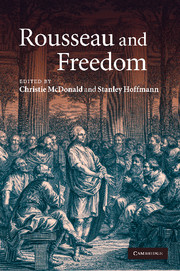Book contents
- Frontmatter
- Contents
- List of illustrations
- Notes on contributors
- Acknowledgments
- List of abbreviations
- Introduction
- PART I
- PART II
- PART III
- 14 Paranoia and freedom in Rousseau's final decade
- 15 Freedom and the project of idleness
- 16 On the uses of negative freedom
- 17 Fail better: Rousseau's creative délire
- Postface: Rousseau and freedom
- Bibliography
- Index
14 - Paranoia and freedom in Rousseau's final decade
Published online by Cambridge University Press: 05 May 2010
- Frontmatter
- Contents
- List of illustrations
- Notes on contributors
- Acknowledgments
- List of abbreviations
- Introduction
- PART I
- PART II
- PART III
- 14 Paranoia and freedom in Rousseau's final decade
- 15 Freedom and the project of idleness
- 16 On the uses of negative freedom
- 17 Fail better: Rousseau's creative délire
- Postface: Rousseau and freedom
- Bibliography
- Index
Summary
In this essay I want to consider the problem of psychological freedom in Rousseau's largely neglected final decade – neglected, first, because the Confessions stops short of it and, in the Anglophone world, because Maurice Cranston, author of the standard biography in English, died before he could cover it. By “psychological freedom,” I mean an interior consciousness, a sentiment de liberté closely related to le sentiment de l'existence that Rousseau celebrates so eloquently in the Confessions and the Reveries; and I'll bring forward a number of passages from the Reveries and from the Dialogues (or Rousseau, Judge of Jean-Jacques) that carry very different implications from the ones critics usually emphasize.
Most discussions of “freedom” or “liberty” in Rousseau – the words are more or less synonymous in English – have centered on the paradoxes of liberté politique, with Rousseau's notorious declaration that anyone who resists the volonté générale must be coerced: “on le forçera d'être libre.” But, since the focus in the Social Contract is on replacing natural liberty with civil liberty, insofar as psychology is addressed at all, it is in a collective context, encouraging belief in the moi commun, and in a factitious civil religion that may not be literally “true” but serves to reconcile citizens to their duties.
From the point of view of individual psychology, Emile, published at the same period in Rousseau's life, is more relevant. Here, too, are paradoxes.
- Type
- Chapter
- Information
- Rousseau and Freedom , pp. 231 - 244Publisher: Cambridge University PressPrint publication year: 2010
- 1
- Cited by

